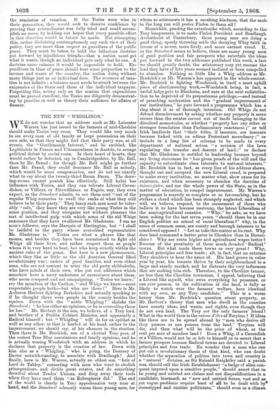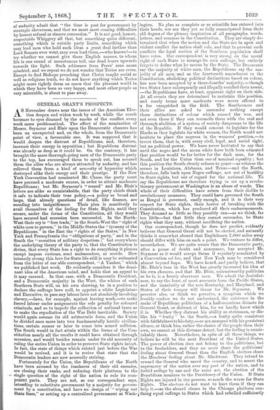THE NEW " WHIGLINGS."
WE do not wonder that an address such as Mr. Leicester Warren has just issued to the farmers of mid-Cheshire should make Tories very cross. They would like very much to see every man of old family or large possessions on their own side, so that they might feel that their party was, at all events, the "Gentlemanly Interest," and be entitled, like Legitimists in France and Ultramontanes in Austria, to avenge political defeat by social scorn. In their heart of hearts, they would rather be defeated, say in Cambridgeshire, by Mr. Ball, than by Mr. Brand ; for though Mr. Ball might go further than Mr. Brand, they could denounce Mr. Ball as nobody, which would be some compensation, and do not see exactly what to say about the twenty-third Baron Deere. The draw- ing-rooms cannot punish him effectively. Still habit has influence with Tories, and they can tolerate Liberal Caven- dishes, or Villiers, or Fitzwilliams, or Pagets, nay, they even expect, as the Standard admits, to see them sent "out of the regular Whig nurseries to swell the ranks of what they still believe to be their party." They fancy such men must be toler- ably "safe," they know they are very like young Tories in the same position, and they recognize not without pleasure the sort of intellectual gulp with which some of the old Whigs announce that they have swallowed Mr. Gladstone. I am no man's follower, says the Marquis of Hartington, but "I shall be faithful to the party whose accredited representative Mr. Gladstone is." Tories see what a phrase like that means, and besides they have been accustomed to fight old Whigs all their lives, and rather respect them as people whom it is very hard to beat, but who keep strictly within the ancient rules of the game. But here is a new phenomenon, which they like as little as the old Austrian General liked revolutionary war ; cadets of good families, and even eldest sons, who are not content to utter the old party shibboleths, who have minds of their own, who put out addresses which somehow have a nasty undertone of earnestness about them, who mean conquest and not campaigning. "Tories we know," cry the members of the Carlton, "and Whigs we know—most respectable people both—but who are these ?" Here is Mr. Auberon Herbert fighting Berkshire and actually speaking as if he thought there were people in the county besides the squires. Down with the "noble Whigling !" shrieks the Standard; "he has either no opinions, or he is concealing those he has." Mr. Herbert is the son, we believe, of a Tory lord, and brother of a Peelite Cabinet Minister, and apparently a Radical himself ; but " Whigling " will do for an epithet as well as any other, so that is hurled at his head, rather to the improvement, we should say, of his chances in the election. Then there is Mr. Brodrick, son of a clerical Tory peer, of the veriest True Blue associations and family opinions, and he is actually wooing Woodstock with an address in which he declares that property is the creation of law. Down with him also as a " Whigling," who is going, the Deanery of Exeter notwithstanding, to associate with Bradlaugh I And finally, here is Mr. Warren, actually an eldest son, "heir of Lord de Tabley," consorting with men who want to abolish primogeniture, and divide great estates, and do something dreadful about Trades' Unions, and fling away their tools when they have used them "as Robespierre did." The end of the world is clearly in Tory apprehension very near at hand, and the Standard solemnly warns these young men, for whom as aristocrats it has a sneaking kindness, that the mob, in the long ran will prefer Finlen to them all I Meanwhile, pending the catastrophe which, according to the- Tory lampooners, is to make Finlen President and Bradlaugh Archatheist of Canterbury, these young men are doing a good thing, openly throwing aside the decaying Whig faith in favour of a newer, more lively, and more earnest creed. If,. as the Standard seems to believe, there are many young men of good position and fair prospects who entertain the ideas. put forward in the two addresses published this week, a fact, we should greatly doubt, the aristocracy may yet resume the lead they have of late years seemed inclined or been compelled to abandon. Nothing so little like a Whig address as Mr. Brodrick's or Mr. Warren's has appeared in the whole contest. Mr. Brodrick is fighting Woodstock, in itself a most uphill piece of electioneering work,—Woodstock being, in fact, a. useful lodge gate to Blenheim, and sure at the next redistribu- tion to be deprived of its preposterous privilege,—and instead of preaching moderation and the "gradual improvement of institutions," he puts forward a programme which has a ring about it as of thorough intention. Old Whigs do not defend disendowment by asking whether any property is more secure than the estates carved out of lands belonging to the dissolved monasteries, or whether "property has any other or- stronger foundation than Parliamentary enactment ;" or tell Irish landlords that "their titles, if insecure, are insecure because linked with an odious Protestant ascendancy ;" or include in a long list of reforms to be made in every department of national action "a revision of the laws. regulating the transfer and descent of land;" or declare- that Mr. Gladstone is entitled to leadership because beyond, any living statesman he "has given proofs of the will and the- capacity to subordinate class interests to national interests." Mr. Brodrick has in fact, as every line of his address shows,. thought out and accepted the new Liberal creed, is prepared to make every institution, no matter what, show cause for its existence, and when necessary to abandon the doctrine of laissez-faire, and use the whole power of the State, as in the matter of education, to compel improvement. Mr. Warren's. programme is scarcely so complete or so far-reaching, but he strikes a chord which has been strangely neglected, and which will, we believe, respond, to the amazement of those who- believe it to have become unstrung, the latent Liberalism of the semi-agricultural counties. "Why," he asks, as we have- been asking for the last seven years, "should there be in our English politics no school of rural liberalism?" why, in the- name of common sense, are county and borough interests to be considered opposed ? "Let us take this matter at its root. Why does land command a better price in Cheshire than in Dorset- shire Why are rents higher and agricultural wages better? Because of the proximity of these much dreaded Radical' towns. But what made these towns so very great ? Why, Liberal principles and free trade ; all, in fact, that an extreme Tory shudders to hear the name of. His land grows in value year by year, his tenants thrive by their neighbourhood to a large and steady market, and he distrusts the very influences. that are making him rich. Therefore, to the Cheshire farmer, no less than the Cheshire townsman, I appeal, believing that a Liberal like myself, who owes everything he possesses, or can ever possess, to the cultivation of the land, is fully as likely to watch over the farmers' welfare, here identical with my own, as any Tory candidate." This is a worse heresy than Mr. Brodrick's question about property, or Mr. Herbert's theory that men who dwell in the counties have county ideas, and wants, and rights, even though they do not own land. The Tory not the only farmers' friend! What in the world then is the raison d'être of Toryism ? If ideas- like these are to be spread abroad by "men who derive all they possess or can possess from the land," Toryism will die, and then what will be the price of wheat, or the rent per acre of meadow land ? Even a Whig, if a Cavendish or a Villiers, would not be so left to himself as to assert that a. farmer prospers because Radical towns are devoted to Liberal principles and free trade. No wonder that a man who can put out a revolutionary thesis of that kind, who can doubt whether the separation of politics into town and country ix a "natural" division, as Sir llainald Knightley said a parish, was, should call the Irish Establishment "a badge of alien con- quest imposed upon a sensitive people," should assert that to be young and untried are claims and not disqualifications in a. candidate, inasmuch as "new and untried forces, vast and as- yet vague problems require least of all to be dealt with by' stereotyped and routine politicians," should even as a climax
of audacity admit that "the time is past for government by strategic cleverness, and that we must meet coming difficulties by honest refusal or sincere concession." It is not good, honest, respectable Whiggery all that, but something quite different, something which is outside party limits, something which may lead men who hold such ideas a great deal farther than Lord Somers ever went, may even lead them,—who knows I—to try whether we cannot give these English masses, to whom life is one round of monotonous toil, one dead heave upwards towards the light. Such addresses from Peers' sons mean mischief, and we repeat we de not wonder that Tories are cross. Except to find Bishops preaching that Christ taught social as well as religious truth, we do not know anything which Tories might more rightly deem an omen that the pleasant world in which they have been so very happy, and most other people so very miserable, is about to pass away.































 Previous page
Previous page